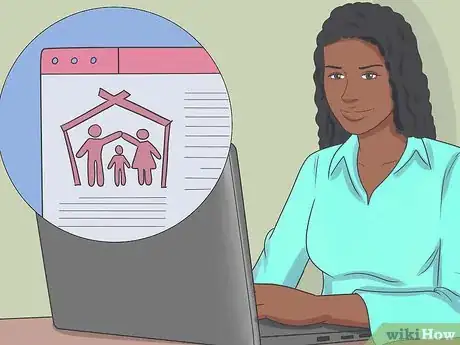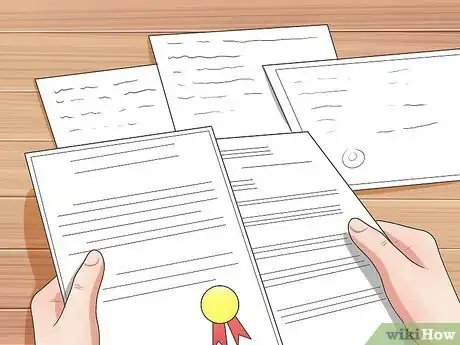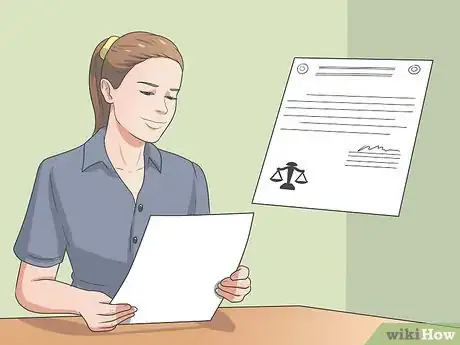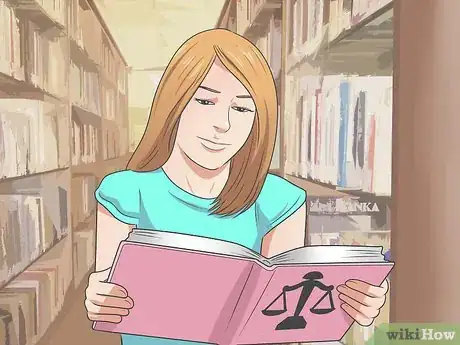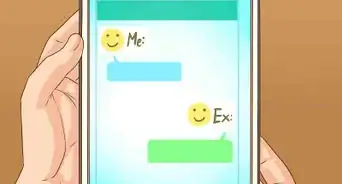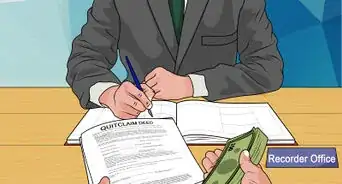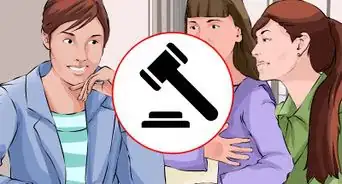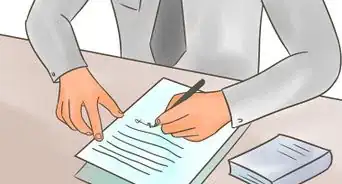wikiHow is a “wiki,” similar to Wikipedia, which means that many of our articles are co-written by multiple authors. To create this article, 17 people, some anonymous, worked to edit and improve it over time.
This article has been viewed 437,204 times.
Learn more...
Termination of parental rights can be ordered by the court in situations involving neglect or abuse, or if the parent has abandoned the children or refuses to see them. In these cases, it's important to understand the process to terminate parental rights so that the proceedings are enacted legally and in the best interests of the children. Learn how to terminate a parent's parental rights so you can successfully navigate this difficult legal issue.
Steps
Involuntary Termination
-
1Research laws on involuntary termination. Only certain, serious reasons are valid for terminating someone's parental rights without permission. In general, you must be able to show that the child is harmed by contact with the parent. The exact requirements vary depending on location, so check the following:
- If you are in the United States, search this list at childwelfare.gov to find the exact requirements for your state. The advice below focuses on the US process.
- If you are in the European Union, search for your country's legislation at justice.europa.eu.
- Search online if you live in another country. In most regions, physical or sexual abuse, neglect, mental illness, or drug abuse are grounds for termination.[1]
-
2Consider hiring a lawyer. Hiring a lawyer is never required, but it may increase your odds of success and speed up the process. If you cannot afford to hire one, ask the courthouse about free or reduced-price law services. This is recommended whenever possible, but especially for the following cases:
- The termination is involuntary (the parent does not agree).
- Anyone involved in the case is mentally ill.
- Anyone involved in the case is an American Indian. Federal law may apply.
Advertisement -
3Contact a local courthouse. Search for a local courthouse online or ask at your local center of government. In the USA, use the uscourts.gov website and look for a nearby District Court in your state. Once you've found a court, phone and ask the following questions:
- Ask whether this is the correct courthouse to petition for parental rights termination. If not, ask for the phone number of the correct court.
- Ask for the specific document your local court uses. Not all courts will have a document available.
- Ask how many copies of the document you'll need to bring. (Keep one for yourself as well.)
-
4File your documents. Fill out the documents the court supplied and bring them to the courthouse. If the court did not have documents, you will need to create your own. The court will only accept these if you follow strict guidelines while writing them. Try to get advice from a lawyer, courthouse employee, or law librarian. In the US, you'll typically need two documents:
- You'll need a petition explaining the situation and citing the law that allows you to request termination. Use the code number for your state statute here. Some courthouses may use two forms: a Statement of Legal Grounds and the petition itself.
- You'll also need a Summons, which is given to the defendant to start the process.
- Besides the content of the documents, your court probably also has requirements for how they look. Ask the courthouse for a guide on handwriting, typeface, and page layout.
-
5Have the documents served to the parent involved. After filing papers at the court, the court employee should give you one copy to keep and one copy to give to the person whose rights you want to terminate. In most cases, you cannot serve these papers yourself. Have them delivered by hand, through a US citizen over the age of 18 who is not involved in the case.[2] That person may need to fill out a proof of service form and file it with the court immediately.
- Some states have special requirements. To be safe, look them up online or ask at the courthouse before you attempt to serve the papers.
- Deliver these papers promptly. If you don't give them enough advance warning before the hearing, the judge may cancel the hearing.
-
6Gather documentation and evidence. You will need to have evidence or documentation of incidents or issues relating to your attempt to terminate a parent's rights in order to prove your case. Organize your evidence and make sure any documentation meets all the legal requirements to be entered in the case. The court may appoint an investigator who can give you more specific advice.
- If you plan on calling witnesses, you'll need to fill out more paperwork in advance. Ask the courthouse for the forms used in your area.
-
7Attend all scheduled hearings. A court hearing or series of hearings will be scheduled after your petition for termination of parental rights has been filed and reviewed. Attend all the scheduled hearings. Bring all the documentation you prepared.
- It's up to the judge whether the child is required to attend the hearings.[3]
-
8Conduct yourself appropriately. When asking the courts to terminate another parent's rights, it's important that you conduct yourself as a respectable, responsible adult. This will be an emotional issue, but it's important that the judge views you as level-headed and mature. Dress professionally, arrive on time and be calm and respectful in the courtroom.
- Refer to the judge as "your honor." Never interrupt the judge.
-
9Obtain the order of termination. Once the courts have granted your request to terminate parental rights, paperwork will be issued removing their rights to the child. Obtain this documentation for your own records to ensure that the child's rights are protected and that the court's decision is upheld in any future disputes.
- In some states, you may need to fill out a form yourself or write your own document for the judge to sign.
Voluntary Termination
-
1Look into voluntary termination laws. The process may be easier if you are a parent that agrees to the termination. You'll still need approval from a court. Most courts are unlikely to accept the termination unless someone else is ready to adopt the child (and not just the other parent).[4] Teenage mothers overwhelmed by the responsibility may also be able to use this route.[5]
- A parent who cannot support the child may be able to give the baby to a safe haven instead.[6]
- A parent cannot terminate parental rights to avoid paying child support.[7]
-
2Sign the consent form. If you have a valid reason for terminating the rights, and think the child would be better off for it, contact your local courthouse. The first step will be obtaining and signing a consent form.
- Your courthouse may call the form Voluntary Termination of Parental Rights, Voluntary Relinquishment of Parental Rights, Consent to Termination of Parental Rights, Affidavit of Waiver of Parental Rights, or any similar title.
-
3Attend the court hearing. The court employee should let you know when you are due in court. The court may also ask the child and/or the child's guardian to appear. After questioning you about the situation, the judge will make a decision.
- Even if you have legal grounds to request termination, the judge may not allow it. The judge typically rules based on what its best for the child.
- If your rights are terminated, the judge should let you know how this affects your child support payments or other fees.
Community Q&A
-
QuestionCan he ask for a DNA test after he already put his name on the birth certificate?
 Community AnswerMy fiance and I were told by the hospital where we had our daughter that by signing the birth certificate, the man forfeits his right to ask for or receive a DNA test.
Community AnswerMy fiance and I were told by the hospital where we had our daughter that by signing the birth certificate, the man forfeits his right to ask for or receive a DNA test. -
QuestionWould a father's rights be terminated if there was evidence of him selling and doing drugs presented to the court?
 Community AnswerIf it had ever been done around the child or if he was drugged up around the child, quite possibly.
Community AnswerIf it had ever been done around the child or if he was drugged up around the child, quite possibly. -
QuestionDoes a father have parental rights if he isn't on the child's birth certificate?
 Community AnswerHe would have to acquire a DNA test to get any rights.
Community AnswerHe would have to acquire a DNA test to get any rights.
References
- ↑ http://family.findlaw.com/parental-rights-and-liability/terminating-parental-rights.html
- ↑ http://www.serve-now.com/resources/faqs
- ↑ http://www.childtrends.org/wp-content/uploads/2009/09/Child_Trends-2009_09_09_RB_LegalOrphans.pdf
- ↑ https://www.freeadvice.com/legal/voluntary-termination-of-parental-rights/
- ↑ http://nationalparalegal.edu/public_documents/courseware_asp_files/domesticRelations/Parenthood/Termination.asp
- ↑ http://nationalparalegal.edu/public_documents/courseware_asp_files/domesticRelations/Parenthood/Termination.asp
- ↑ http://www.lawhelpmn.org/files/1765CC5E-1EC9-4FC4-65EC-957272D8A04E/attachments/1F9ED560-F5C1-484D-8909-C20090BC9C37/f-10-termination-of-parental-rights.pdf
- ↑ http://www.lawhelpmn.org/files/1765CC5E-1EC9-4FC4-65EC-957272D8A04E/attachments/1F9ED560-F5C1-484D-8909-C20090BC9C37/f-10-termination-of-parental-rights.pdf
About This Article
Terminating a father’s parental rights is a major step to take and involves a legal process. If you’re trying to terminate his rights without his permission, note that there are only certain serious instances where this is allowed, like if drug abuse, or physical or mental abuse is involved. You should hire an attorney, since these types of cases are typically complicated. You'll then need to find the correct court in your area to file termination paperwork. Once you’ve completed the relevant form, have it served to the father. You’ll also need to gather documents and other evidence to present at the court hearing, such as failure to pay child support or reports of his inappropriate behavior. Remember to behave responsibly throughout each court hearing, since these types of cases can be very emotionally demanding for everyone involved. For tips on how to find the laws for terminating parental rights in your state or country, keep reading!
